
Castles, Battles, and Bombs: How Economics Explains Military History PDF
426 Pages·2008·1.997 MB·English
Most books are stored in the elastic cloud where traffic is expensive. For this reason, we have a limit on daily download.
Preview Castles, Battles, and Bombs: How Economics Explains Military History
Description:
This book probably will not satisfy readers primarily interested in economic theory, or readers primarily interested in military history. But, if you want to look at military history from a different perspective, or if you are interested in how economic theory could be used to examine and evaluate a complex phenomenon (such as warfare), then this book is very much worth reading. The cross-disciplinary approach taken by the authors is a welcome change of pace, with an analysis that is different from the usual approaches taken in books about economics or books about military history.
The first chapter discusses six economic principles that provide the analytical framework for the seven other chapters in the book: Opportunity Cost; Expected Marginal Costs and Benefits; Substitution; Diminishing Marginal Returns; Asymmetric Information and Hidden Characteristics; and Hidden Actions and Incentive Alignments. Although the authors use the six principles to look at various facets of military history, a reader should consider whether the principles could also be used to provide a different perspective on other subject areas, such as educational institutions, the legal system, and organizational decisions.
Even if a reader is not ultimately persuaded by the thoughtful arguments made in this book, a reader can benefit from reading those arguments and thinking about them. Although I did not find some of the arguments made in the book to be persuasive, I found the book, overall, to be well worth reading.
See more
The list of books you might like
Most books are stored in the elastic cloud where traffic is expensive. For this reason, we have a limit on daily download.
